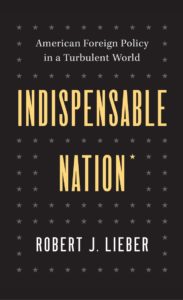 “Indispensable” should not be confused with correct – or capable. An “indispensable nation” should never be confused with a country that always does the right thing or does it well. That said, Robert Lieber’s Indispensable Nation is probably an indispensable book.
“Indispensable” should not be confused with correct – or capable. An “indispensable nation” should never be confused with a country that always does the right thing or does it well. That said, Robert Lieber’s Indispensable Nation is probably an indispensable book.
First, the downside. Published early in 2022, it misses the Russian invasion of Ukraine and the Iranian provision of drones to the Russian military. While that is inevitable, it makes the conversation about Russian behavior – and Iranian behavior – stale. Russia has now committed what appear to be war crimes in Ukraine by attacking civilians and civilian infrastructure with Iranian drones. It appears not to have done that in Georgia or the 2014 Crimea land-grab, but likely did in both Chechen wars.
There is a great upside. Lieber is emeritus professor of government and international affairs at Georgetown University. He has written prolifically about U.S. foreign policy and has advised the State Department, the drafters of U.S. National Intelligence Estimates, and political campaigns. He knows a lot.
Go to the big question. If a nation is, in fact, “indispensable,” what is the thing to which it is indispensable? World peace? The maintenance of a “rules based order?” Treaties and contracts?
Lieber is firmly wedded to treaties, pacts, and agreements, and has a bias against leaving them regardless of their lack of utility or obsolescence, or the cheating of the other parties. Paris Climate Pact, anyone? The 2015 Iran nuclear deal? Open Skies Treaty? On the other hand, he is skeptical of both ends of the current American political spectrum, both those who would withdraw America from the world stage and those who would go bigger and broader. He is also skeptical of what comes between the ends, particularly those who would “share” the world stage with Russia, China, and regionally with Iran. Values matter.
He dissects the candidates for the title of “indispensable nation,” the United States, Europe (more than a notion but not a nation), Russia, and China. The chapter on Europe is worth the price of the book. European giddiness over the election of Barak Obama and disdain for Donald Trump were clearly more on their minds than freedom of navigation or limits on nuclear capability for rogue nations. His own disdain for Germany is evident as he writes, “Sanctimonious commitment to international institutions, an inclination to tell others what to do, and a propensity to insist on peaceful conflict resolution even in circumstances where there is no hope of peace.”
The China chapter is terrific. An overview of how America’s misunderstanding of China’s long-term plans was exacerbated by underestimating just how long those terms were. It was one thing for the Nixon administration to believe an opening to China was appropriate. Even Bill Clinton’s determination to bring China into the WTO was understandable.
But those who promoted the wholesale sale and transfer of American technology and production capability clearly saw no downside. China has moved openly to capture international institutions, American college campuses, trade routes through the Middle East and Africa, control the mines producing the raw materials necessary for everything from computer chips to electric cars to solar panels. The influx of money led to the repression of Hong Kong, threats not only to Taiwan but to other American allies including Japan, South Korea, and the Philippines, along with the repression of its own people. And left the rest of the world unable to learn much about the origins of the COVID pandemic in a timely way. Chinese disinformation campaigns are well covered.
The Russia section suffers a bit from being written before the invasion of Ukraine in 2022, when some people might have thought there was a reasonable case to be made for not having a single superpower – not having the U.S. and its allies be responsible for the Global Commons. Lieber cites Graham Allison of Harvard’s Kennedy School, who wrote in Foreign Affairs, 2020:
At a time when Washington identifies “a new era of great power competition,” and with China and Russia both asserting their power, America should accommodate itself to a spheres-of-influence policy, in which great powers “demand deference from other states in their own regions or exert predominant control there.”
And Robert Zoellick wrote in The Wall Street Journal in April 2020, before the scope of the pandemic – and China’s culpability – were fully understood:
China has decided to combine recovery at home with advocating for a world community of shared interests’ with “the underlying aim of promoting ‘globalization with Chinese characteristics.’”
Had American leadership been paying attention to history and the Russian movement to recapture “Russian territory” on its borders, Ukraine would have been less of a surprise. Russia is, to Lieber, a “revisionist power,” looking for the restoration of its empire. Our Western belief that Russian investments in its military over the past 20 years had produced a conventional Russian army/air force that would threaten NATO, however, has been smashed by Russian inability to bring a serious force to bear in Ukraine. On the other hand, failure has pushed Russia to a campaign of attacks on civilians and civilian infrastructure that should be investigated as war crimes.
However, having found common cause with China in the United Nations, two of the five Permanent Seats on the Security Council, Russia has been successful in blocking criticism of Moscow or Beijing. The UN has proven itself entirely unable to deal with depredations committed by a Security Council member (it skipped over Beijing’s repression of Hong Kong and the Uyghur genocide for the same reason).
Lieber himself, even without the benefit of hindsight, wisely notes that “the revisionist powers might have other priorities than living in harmony with America.” He argues against spheres of influence, noting that this has at least as much chance of pulling America into unwanted wars as preventing them. Our friends in the Pacific, for example, may be unwilling to lie down under China’s boot, and Europe and the Middle East have had a taste of Russia and don’t like it.
So, if not Europe and not China or Russia, then who. Or what?
Lieber points to:
[A] familiar list of shared global problems, including nuclear proliferation and arms control, terrorism, climate change, financial crises, rules and norms for international trade, refugees, human rights and the rule of law. Each of those problems calls for a collective response to what is a mostly shared challenge, but there exists no global government to resolve them.
Not only no global government (thank goodness) but perhaps too much reliance on the enforcement of treaties and laws to prod the recalcitrant into obeying the will of the “world.” Russia and Iran cheated on nuclear proliferation and terrorism, China and India among lots and lots of others, cheated on pollution goals and climate change. America’s southern neighbors subvert the very principle of borders – Mexico transports thousands of migrants, not to mention drugs, through its own country ignoring its own laws to shove them over the border into ours. Immigration laws in Europe? A joke. Human rights and rule of law? Worse.
Lieber slams President Donald Trump for withdrawing from a series of treaties/pacts but if we were the only ones abiding by them, or others were actively subverting them, he has to make a better case for staying in. He does, in fact, acknowledge the shortcomings of the Joint Comprehensive Plan of Action (JCPOA) with Iran.
The back end of the book is, generally, comforting. America is not “in decline,” despite reports from people who think it is or want it to be. The conditions of 1945 were bound to change, but the U.S. has changed as well. And the great advances in technology and trade made by China in the past 40 years are being undermined by the aging and declining Chinese population plus the increasing repression of those with new, better or different ideas. Although Lieber didn’t know it, Russia is over and Iran is facing a rebellion it cannot seem to contain.
But how good are we?
Here is the best part: there is a discussion to be had as to whether the U.S. is any better than Russia or China or Iran. People in our own country routinely trot out the slave trade and Indian wars to suggest that we are in fact no better than the Nazis, the Communists, or the mullahs. They talk about “regime change” and “democracy promotion,” and the American overthrow of the governments of Iraq, Libya, and Egypt. Have this discussion with your friends – or better, with your adult children.
First, going back centuries doesn’t seem useful if it is limited to the United States of America. All of the world engaged in slave trade and not all of it was a) from Africa or b) conducted by white people against black people. See Victory in Tripoli by Joshua London (reviewed by inFOCUS Quarterly, Fall 2019) for a look at Muslim Berbers kidnapping both black Africans and while Christians. EtymologyOnline traces the word “slave” to the Old French esclave (13th century) “from Medieval Latin Sclavus ‘slave’ … originally ‘Slav’ – so used in this sense because of the many Slavs sold into slavery by conquering peoples.”
The entire continent of South America plus parts of the Caribbean speaks Spanish or Portuguese because it was raped by the Spanish and Portuguese. Dutch and English are there, too, courtesy of conquerors. China and Japan were slave holding conquerors in Asia. Is the past disqualifying in the present? Ask the successors to Nazi Germany. There has to be room for growth.
Second, agreeing that the U.S.-led “Arab Spring” was a disaster for many people of the region, what was the intention? What did the U.S. seek? What does China seek in Xinjiang Province? What does Iran seek in Iraq, Syria, Lebanon, and Yemen? So, yes. The attempted export of democracy and freedom for the people of the region ran headlong into a culture that we didn’t understand; our mistakes were legion – but not venal.
We are, in fact, different.
The end is slightly disappointing. Lieber’s conclusion is for the U.S. to engage its friends, reinvigorate pacts, treaties, and international organizations – he is oddly OK with the UN under some circumstances, but not the JCPOA – and then back them up with military force equal to the job. He doesn’t mention cost. Writing early in the Biden administration, he hopes Biden can do it all, but in 2023, that seems out of touch.
But still – definitely buy it, read it, discuss it.
Shoshana Bryen is Editor of inFOCUS Quarterly and Senior Director of the Jewish Policy Center.





